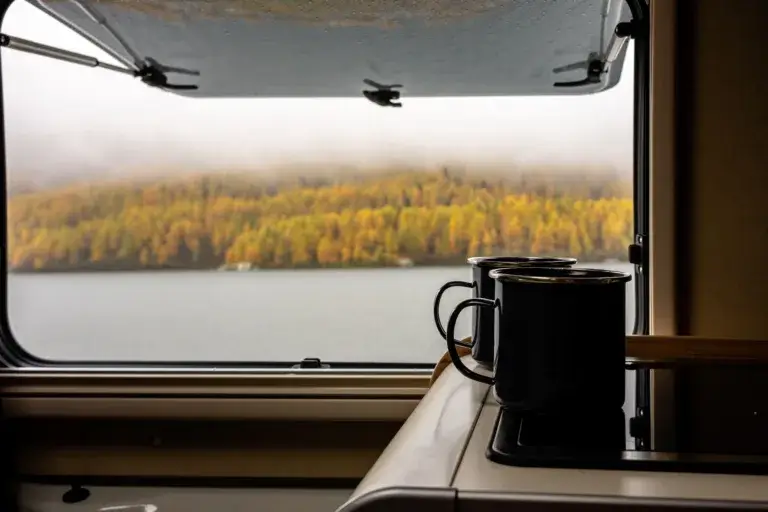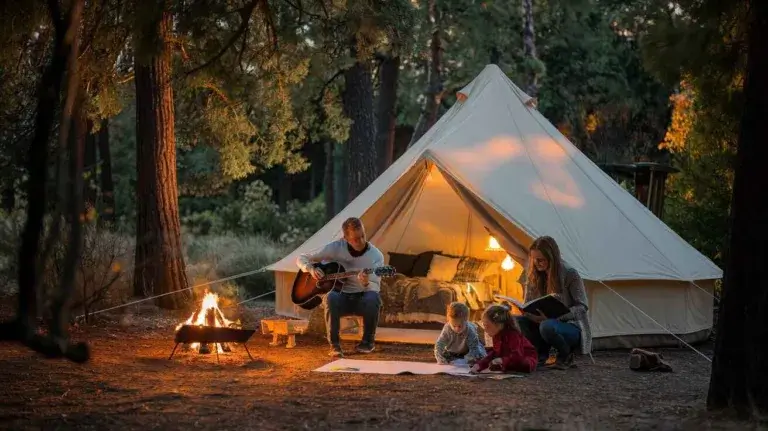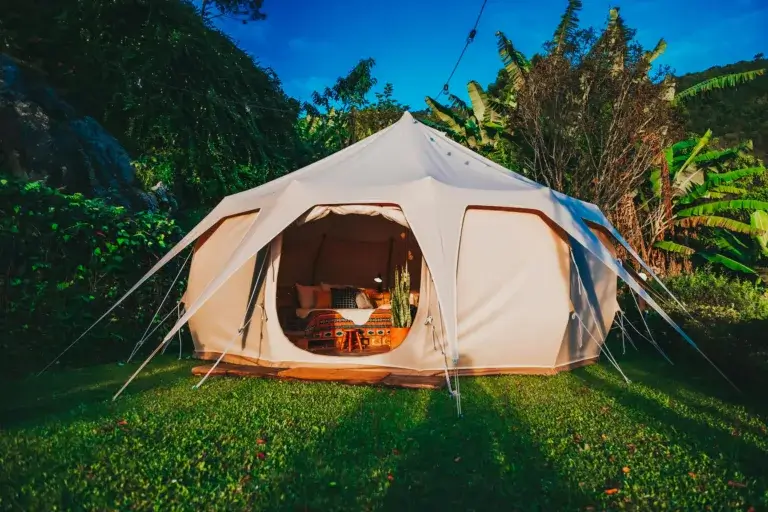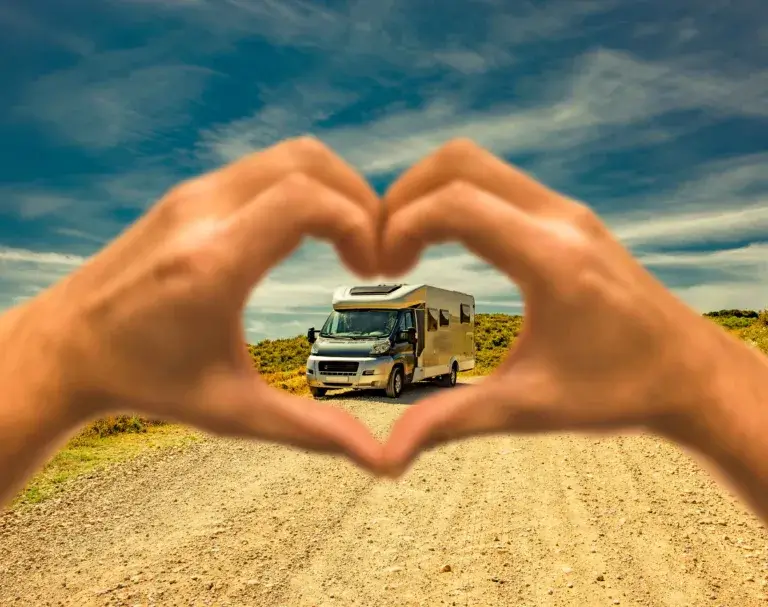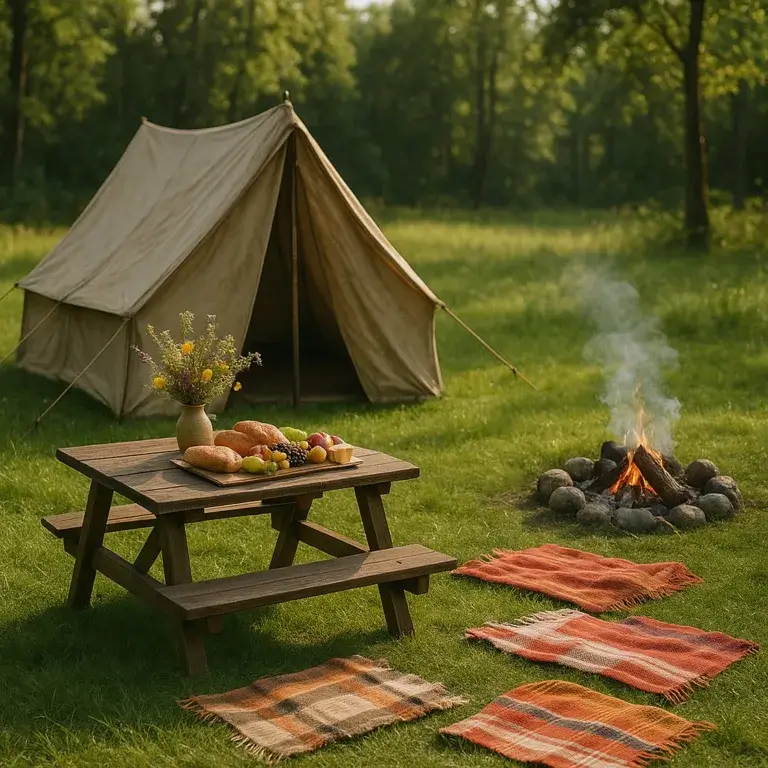How to Maintain a Clutter-Free Camper Lifestyle: Daily Minimalism Habits and Smart Organization
Living in a camper has taught me that keeping clutter at bay isn’t just about owning less stuff – it’s about making room for freedom and adventure. Staying clutter-free depends on daily habits, smart storage, and only keeping what’s essential.
The difference between a cramped, chaotic camper and a peaceful rolling home? Simple systems that fit your lifestyle, not fight it.

Camper minimalism really comes down to building routines that stop clutter before it starts. My first year on the road, I spent way too much time organizing instead of exploring.
Now, I kick off each day with a five-minute tidy and stick to the “one in, one out” rule. It’s simple, but it works.
What I love about RV minimalism is the mental clarity it brings. When everything has a place and I’m not tripping over stuff, I can focus on the adventure and the memories I’m making.
Key Takeaways
- Five-minute daily tidies beat marathon cleaning sessions every time.
- Smart storage and “one in, one out” keep your camper from overflowing.
- Essentials only means more freedom, less stress, and better travel.
Why Minimalism and Decluttering Are Essential for Camper Life
Living in a camper demands an intentional approach to your stuff. Minimalism becomes your secret weapon against tight quarters, and decluttering lets you breathe easier in the smallest spaces.
The Benefits of a Clutter-Free Lifestyle
Keeping my camper clutter-free has done more than free up space – it’s given me peace of mind.
When everything’s in its place, I spend less time hunting for things and more time getting out and exploring. My stress dropped once I ditched the piles of “just in case” items.
Physical Health Improvements:
- Air flows better, even in tiny spaces.
- Less dust and fewer allergens.
- No more tripping over random gear.
Surprisingly, I saved money too. I stopped buying duplicates because I could finally see what I owned. Decluttering helps you rediscover forgotten treasures, and that’s a win for your wallet.
Fewer distractions mean getting more done. Whether I’m planning a route, cooking, or just chilling, I can actually focus. The calm space even helps me sleep better and reduces anxiety.
Unique Challenges of RV and Camper Living
Space is tight in a camper – no surprise there. Every inch matters, and you can’t just shove things in a closet and forget about them.
Campervan storage is all about layout. My overhead bins can’t handle heavy stuff, but under-bed storage is perfect for gear.
Common Storage Limitations:
- Cabinets fill up fast, especially in the kitchen.
- Closets are narrow, so clothes have to earn their spot.
- Weight restrictions are real – too much stuff isn’t just messy, it’s unsafe.
- No basement or attic for off-season storage.
Temperature swings mess with your stuff, too. Humidity sneaks in and ruins anything left in dark corners. I’ve had to rethink what fabrics and materials make sense for life on the road.
Water and power limits shape my habits. I can’t run everything at once, and storing lots of things that need electricity or water is a no-go.
How Minimalist Living Enhances Travel Freedom
Traveling light changed everything for me. I can pack up and hit the road in under an hour because everything has a home.
When the urge to explore strikes, I’m not stuck reorganizing or packing up mountains of stuff.
Travel Freedom Benefits:
- Quick setups and pack-downs.
- Better gas mileage – less weight = less fuel.
- Navigating tight roads is way easier.
- More cash for adventures, not storage.
My minimalist mindset puts experiences first. Instead of buying souvenirs, I’d rather splurge on a local hike or a good meal.
Less stuff also means less cleaning and maintenance. More time for campfires and stargazing? Yes, please.
When the weather turns, I don’t panic. I can secure everything fast and move on, no fragile knick-knacks to worry about.
Setting Up for Success: Decluttering Your Camper

Building a clutter-free camper starts with some tough choices. Every item needs to earn its spot, and that means asking honest questions (and letting go of the guilt).
How to Start the Decluttering Journey
Begin with the low-hanging fruit, expired stuff. Raid your pantry, medicine cabinet, and cleaning supplies. If it’s past its prime, out it goes.
Then, tackle the duplicates. I once had three can openers. Why? Beats me. Now I keep the best one and donate the extras.
Declutter in this order:
- Expired food and meds
- Extra kitchen gadgets
- Clothes you haven’t worn in half a year
- Books and magazines you’re done with
- Décor that just takes up space
The 30-minute method is gold. Set a timer, pick a small area, and go. It keeps things manageable and builds momentum.
Touch each item once – decide, then sort. No circling back.
Embracing Emotional Letting Go
This part? It’s rough. That mug from college or the “maybe one day” jacket – it’s easy to get sentimental.
I started asking: Have I used this lately? Does it serve a purpose? Would I buy it again?
Common things to release:
- Sentimental keepsakes you never look at
- Clothes from a different life (or size)
- Gadgets for recipes you don’t make
- Books you won’t reread
- Craft supplies from abandoned hobbies
Honestly, memories aren’t in things; they’re in you. I take photos of sentimental items before donating them. Works like a charm.
Sometimes, I thank an item before letting it go. It sounds a little silly, but it helps.
The Keep, Donate, or Toss Method
I use three bags or boxes every decluttering session. It keeps things simple and speeds up decisions.
Keep pile:
- Used in the last 3 months
- Multi-purpose
- Genuinely useful or brings joy
- Necessary for safety or health
Donate pile:
- Good condition but unused
- Clothes that don’t fit your life now
- Books, games, and extra kitchen tools
Toss pile:
- Broken beyond repair
- Expired or gross
- Stained or worn-out
- Missing parts
If you’re stuck, make a “maybe” box. Store it out of sight for three months. Didn’t need anything? Donate the whole thing – no peeking.
Being a bit ruthless at the start makes life on the road so much easier. Every item left should earn its keep.
Organize Your RV Like a Pro: Practical Organization Tips
Smart RV organization means giving everything a home and using every inch of vertical space. Think of your camper as a puzzle – every piece needs a perfect spot.
Zones and Categories: Giving Everything a Home
Randomly tossing things in cabinets? Learned the hard way that it’s a recipe for chaos.
Now, I set up zones for different activities. Kitchen stuff in one cabinet, dishes in another, food in a third. Morning routine gear all lives in the same bathroom drawer.
Storage bins are lifesavers. I use clear ones – one for camping gear, one for cleaning supplies, and another for electronics.
Label everything. You think you’ll remember – trust me, you won’t. I use a label maker, but tape and a marker work too.
The best RV organization hacks group things by function, not by size. Keep coffee, mugs, and filters together, even if they could fit elsewhere.
Closet and Drawer Solutions for Small Spaces
RV closets are tiny, but hanging organizers make a huge difference. I installed one with several compartments, so my clothes stay sorted.
Folding wall-mounted hangers are genius. They tuck away when not in use and pop out for jackets or wet towels. Super handy on rainy days.
Drawer dividers keep chaos at bay. I use adjustable organizers to fit any drawer. Utensils, bottle openers – everything stays put.
Vacuum bags shrink bulky clothes down to nothing. I stash winter gear this way during summer trips.
Under-bed bins are perfect for extra bedding, towels, or off-season clothes. Just roll them out when needed.
Surface Solutions: Keeping Counters and Tables Clear
Clear counters make small spaces feel bigger and calmer. My rule: only leave out what I use all the time.
A swivel drawer under the kitchen counter holds little things – phones, keys, sunglasses. Out of sight, out of mind.
Clip-on baskets are awesome for extra storage. I clip one inside the pantry for spices, another under the bathroom sink for toiletries.
Suction cup hooks stick anywhere smooth. I use them on windows, mirrors, and cabinet doors for dish towels or washcloths.
The table stays clear when everything has a nearby home. I keep a small basket on a shelf next to the dining table for the day’s odds and ends.
Smart Storage: Making the Most of Every Inch
I’ve learned pretty quickly that camper life lives or dies by how well you use your space. Every little corner can become useful if you get creative.
Strategically placed furniture and smart containers can double what you can store, but you don’t want to end up with a cluttered mess. It’s like a puzzle – one that’s oddly satisfying when you get it right.
Choosing Functional Furniture for Multipurpose Use
Back when I started, I brought in regular furniture that only did one thing. Big mistake.
Now, I only use pieces that pull double or even triple duty. My ottoman, for example, acts as a seat, a footrest, and a secret board game vault.
The removable top is sturdy enough for my laptop, so it’s my go-to desk when I’m working from the dinette. Storage beds changed the game for me.
I swapped out the standard RV mattress for one with deep drawers underneath. Those drawers hold my off-season clothes, extra blankets, and a surprising amount of camping gear.
If you’re looking for ideas, check out these multi-functional furniture pieces:
- Dining bench with lift-up seat – hides table linens and dishes
- Coffee table with shelves – keeps books, remotes, and snacks in check
- Fold-down desk – workspace when you need it, invisible when you don’t
Nesting tables are the best. They give me extra surface area during meals, then disappear when I need the floor space back.
Using Storage Containers Effectively
Storage containers are my unsung heroes. The trick is picking the right size and type for each job.
Clear containers save me from endless digging. I can spot my coffee stash without opening five bins.
In the pantry, I use airtight containers that stack just right and keep bugs out of my oatmeal. Under the bed, rolling containers make life easier.
I just slide them out to grab winter clothes or extra supplies. Those little wheels are a lifesaver when you’re dealing with heavy stuff.
For the bathroom, I found slim containers that fit between the toilet and vanity. They hold all the extra toiletries and cleaning supplies that never seem to have a home.
Here’s my go-to container strategy:
| Area | Container Type | Best For |
|---|---|---|
| Pantry | Medium stackable | Dry goods, snacks |
| Closet | Fabric bins | Clothes, accessories |
| Under bed | Rolling drawers | Seasonal items |
| Bathroom | Slim towers | Toiletries, medicines |
Labels are your best friend. After a long hike, the last thing you want is a guessing game just to find the coffee.
Maximizing Vertical and Overhead Space
I used to ignore everything above eye level. Big mistake, there’s so much storage potential up there.
Overhead cabinets are perfect for lightweight stuff I rarely need. That’s where I stash holiday decorations, extra blankets, and folding chairs.
I keep a step stool handy so I don’t have to risk a wobbly climb. Wall-mounted solutions changed my kitchen for the better.
A magnetic strip holds my knives and utensils, and spice jars stick to magnetic containers on the fridge. Vertical storage solutions like tension rods inside cabinets give me a spot to hang cleaning supplies.
Door organizers work for shoes, toiletries, or whatever else you can think of. Hooks are everywhere – behind doors, on walls, inside cabinets.
They hold dish towels, hats, and yes, my favorite coffee mug. Even my shower has a tension caddy from floor to ceiling.
It holds all the bath products, doesn’t take up floor space, and I didn’t have to drill a single hole. Pro tip: Keep things you use often at chest height.
Save the harder-to-reach spots for backup or seasonal supplies. It’ll save you a lot of climbing around.
Daily Habits for a Clutter-Free Routine
Keeping a camper tidy isn’t about big weekend cleanups. It’s those little daily habits that keep the chaos from taking over.
The One In, One Out Rule
My closet exploded with clothes I forgot I owned. Now, every time I bring something in, something else has to go.
This goes for books, groceries, gear – everything. New book? Old one goes in the donation bag.
Fresh groceries? I use up what’s already in the fridge. New gear? Out with the worn-out stuff.
This rule forces me to think before I buy. That cute mug at the gift shop? I have to decide which mug I’m willing to part with first.
I keep a donation bag under my bed and drop it off whenever I hit a town. This daily decluttering habit really sticks after a few weeks.
Quick Morning and Evening Resets
My morning reset is fast – about three minutes. I make the bed, clear the counters, and do a quick sweep of each area.
Evening resets are where the magic happens. I spend ten minutes putting everything back.
Dishes get washed and put away. Clothes go in the hamper or back on hangers.
My evening checklist:
- Clear all surfaces
- Put away daily-use items
- Prep tomorrow’s essentials
- Quick floor sweep
This clutter-free daily routine means I wake up to a peaceful space every morning. There’s something so satisfying about starting the day with a clean slate.
Declutter-As-You-Go Mindset
I don’t let little messes pile up anymore. If I use the can opener, I wash it right away.
Change clothes? Straight into the hamper or back on the hanger. This habit changed my camper life.
I used to spend whole afternoons cleaning. Now, I just keep up with it as I go.
When I cook, I clean as I go. While coffee brews, I wipe the counters.
These simple organization habits keep things from getting out of hand. In a small space, every item matters.
Sustaining Minimalism on the Road
Living a minimalist lifestyle while traveling takes daily discipline and a few clever tricks. It’s all about making intentional choices, finding creative ways to honor memories, and building mental habits that support your clutter-free life.
Shopping Intentionally and Avoiding Impulse Buys
The biggest threat to my minimalist camper isn’t what I already own – it’s what I’m tempted to buy next.
That “one in, one out” rule saves me from myself. When I want something new, I ask what I’m willing to give up first.
I keep a list on my phone of things I actually need. If I see something tempting, I check the list.
If it’s not there, I snap a photo and wait 24 hours. Usually, the urge passes.
Here are a few shopping strategies that help me out:
- Shop with a specific list and stick to it
- Avoid wandering through sections you don’t need
- Pick multi-purpose items over single-use ones
- Buy consumables instead of more permanent stuff
Tourist traps are my weakness. Those handmade crafts are so tempting.
Now I buy postcards or take photos instead of collecting souvenirs. Before I buy anything, I ask myself three things: Does this solve a real problem? Do I have space for it? Will I still want it next month?
Managing Sentimental Items in a Compact Space
Sentimental stuff used to trip me up. Ticket stubs, beach shells, little gifts – they all piled up.
Now, digital solutions save my sanity. I snap photos of important documents and mementos.
Monthly photo albums on my phone keep the memories, but not the clutter. I keep just one small memory box – about the size of a shoebox.
When it fills up, I sort through and keep only what really matters.
Some creative ways to honor memories:
| Method | Example |
|---|---|
| Photo journals | Pic of a concert ticket with a note about the night |
| Digital scrapbooks | Scan postcards and add location info |
| Story writing | Write about special moments instead of keeping stuff |
| Small displays | Rotate a few favorites on a shelf |
If someone gives me a big or meaningful gift, I try to be honest. I explain my lifestyle and suggest shared experiences or consumable gifts instead.
Staying Motivated with a Clutter-Free Mindset
Some mornings, my tiny space feels more cramped than cozy. That’s when I remind myself why I do this.
I keep a list on my phone of all the perks I’ve gained from minimalist living: less cleaning, easier organizing, lower stress, and more money for adventures.
Reading it helps me refocus.
A few daily habits keep me on track:
- Make the bed and clear surfaces every morning
- Ten-minute pickup before bed
- Organize one small area each week
- Celebrate when I resist an impulse buy
I follow other minimalist travelers online for inspiration. Their beautiful, simple spaces remind me that less really can be more.
On days I feel deprived, I focus on what I’ve gained – more time for hiking, reading, and meeting new people. My energy goes into experiences, not stuff.
Dealing with care packages from family can be tricky. I suggest consumable gifts or ask them to chip in to my travel fund instead.
Frequently Asked Questions
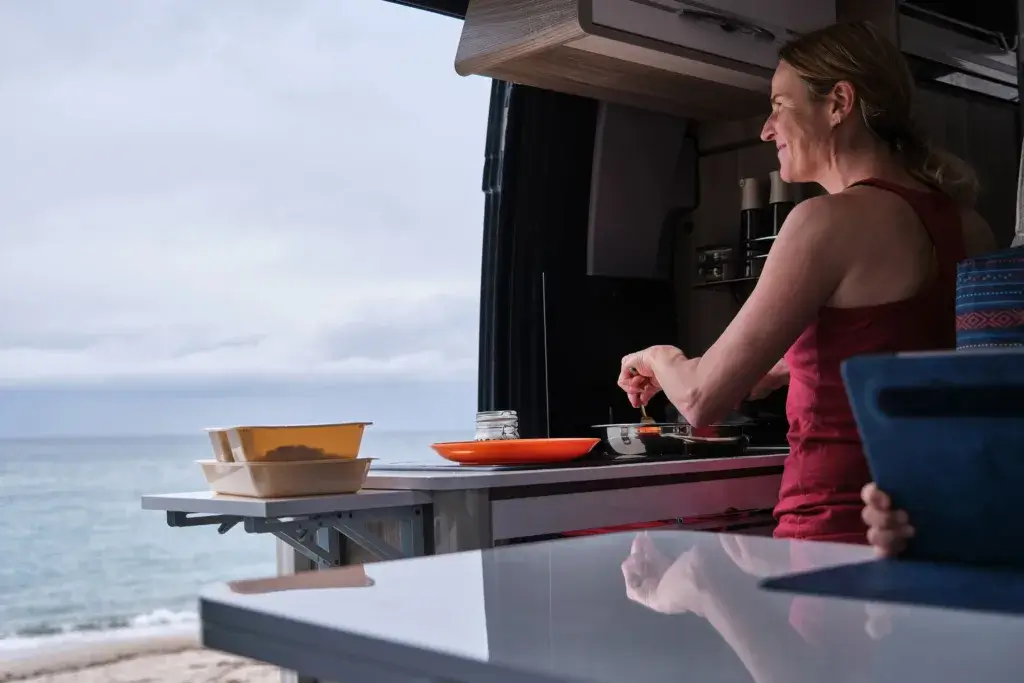
Living in a camper means you get good at daily tidying and letting go of excess. Here are some questions I get and what’s worked for me.
What are your top daily habits to keep your camper feeling spacious and tidy?
I swear by the “one-touch rule” – everything I pick up goes right back where it belongs. No “I’ll deal with it later” piles allowed.
Every morning, I make my bed and do a quick five-minute pickup. It sounds basic, but it stops messes from snowballing.
Before bed, I do an evening reset: clear counters, put away dishes, fold the couch blanket. Waking up to a tidy space feels like a little bit of magic.
And I never break the “one in, one out” policy. When something new comes in, something else leaves. That’s how I keep my stuff from taking over.
Could you share your favorite minimalist practices for managing belongings in a small space?
I’ve got a real soft spot for multi-purpose items that pull double duty. My ottoman? It’s both a cozy seat and a secret storage spot.
My cutting board slides right over the sink, instantly giving me bonus counter space. That little trick saves my sanity during meal prep.
When it comes to gear, I’ll always pick one excellent knife over a drawer full of so-so ones. Fewer, better things just make life smoother in a camper.
Seasonal rotation is my closet’s best friend. I stash away summer clothes when winter hits, then swap them out again when the sun returns.
My “maybe box” is a lifesaver for indecisive moments. If I’m unsure about something, it goes in the box for three months. If I don’t miss it, off it goes to donation – no guilt, just relief.
What’s your secret to staying disciplined with decluttering when you’re living the camper life?
I treat decluttering like an appointment I can’t skip. Once a month, I carve out two hours just to sort through my stuff.
To keep it from feeling like a slog, I crank up some music and try to make it fun. Sometimes, I even find myself dancing when I rediscover something I’d forgotten about.
Every item I keep asks for my time and energy – cleaning, organizing, moving it around. When I think of it like that, letting go feels a lot more like freedom.
Snapping before-and-after photos gives me a huge boost. Seeing the difference in my space is so motivating, it’s almost addictive.
How can someone incorporate the principles of minimalism into their camper lifestyle, especially when it’s hard to let things go?
Don’t try to overhaul everything at once. Start with just one drawer or cabinet. Small wins add up fast, and you won’t get overwhelmed.
I always ask myself: Have I used this in the last year? Does it make me happy or serve a real purpose? Would I buy it again today?
Focusing on essentials instead of what I’m giving up helps me stay positive. It’s about gaining space and peace, not just losing stuff.
For sentimental things, I snap a photo before donating. My phone stores all those memories, and my cabinets stay blissfully uncluttered.
Can you give us a whimsical rundown on organizing essentials for tiny living quarters?
Picture your camper as a puzzle – every piece needs its spot. I swear by clear containers, so I never have to dig around guessing what’s inside.
Vertical space is pure gold. I hang organizers on doors and stack bins up high, making every inch count.
My spices live in little magnetic tins stuck to the fridge. They look like shiny polka dots and make cooking a little more fun.
Vacuum-sealed bags are my secret weapon for bedding and off-season clothes. They squish everything down, saving a ton of space.
Hooks are everywhere in my camper – on walls, cabinets, and doors. They hold towels, hats, even my hiking pack, and keep things handy without clutter.
What are some clever storage solutions that have helped you keep your mobile home clutter-free and functional?
Under-bed storage boxes on wheels have totally changed how I keep my bedroom tidy. I just roll them out when I need to grab some off-season clothes or those extra odds and ends.
I put a tension rod under my sink and started hanging up all my spray bottles and cleaning stuff. Suddenly, the cabinet floor had room for all the other random essentials I never knew where to stash. If you like a good hack, here’s a link with more ideas.
Mesh laundry bags in the shower? Game-changer. They hang there, hold all my toiletries, and dry in no time. Plus, I can see everything at a glance and never have to dig around.
My fold-down desk is probably my favorite feature. It’s mounted right on the wall, so when I’m done working, I just fold it up and – poof – my living space is back. If you’re short on space, this one’s a must.
For the kitchen, I made some drawer dividers out of little boxes I had lying around. Now my utensils don’t rattle around every time I hit a pothole, which is honestly a small victory in itself.


